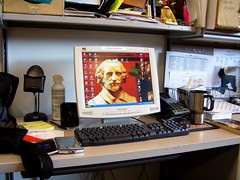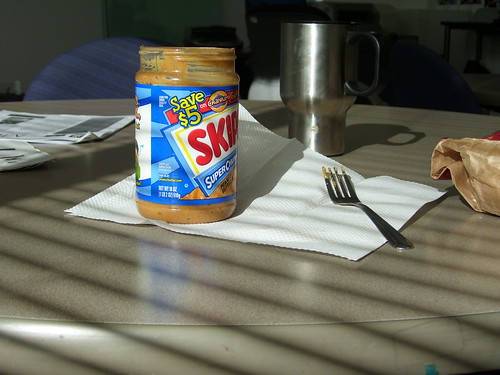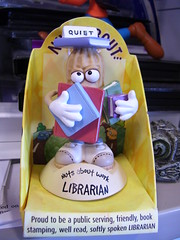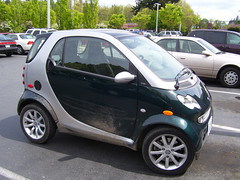
By Michael Pollan
Known among book clubs as the author of Botany of Desire, Michael Pollan follows up on his fifteen minutes of fame with another book about how millions of years of evolution can’t be all wrong while 60 years of industrial farming development certainly may be. That is, once people have moved away from being their own hunter-gatherers, deciding what to eat becomes a trickier question than seems readily apparent to most consumers.
The strong points of this book are its lively presentation of information, both researched from sources and from personal experience; the interesting and sympathetic people—both industrial food source producers and non-industrial food source producers and a problematic hybrid of the two, large-scale organic food producers—that Pollan introduces to readers. Pollan’s humor and reasoned approach to his topic are also refreshing.
A weakness of the writing is that some phrases and words are repeated more than felt felicitous for me. Pollan identifies his sections of the book as he investigates the different paths that food might take from living entity to food on the table, but in his reporting, he sometimes makes some large leaps in geography and time back and forth through his experiences. The repetition of phrases and words and ideas gives the book an aura of being a collection of articles on this topic. Still, while this weakens the book if one is reading straight through, it also means that one could read in any one section and have a coherent presentation of Pollan’s ideas and discoveries about the topic(s) under consideration.
I listened to the recorded book (on CD), and I think the redundancy was helpful in that format (even though I noticed it and it disconcerted me enough that I had to examine what I really felt about the repetitions), because if I missed a point, he would remind the reader about it a little later on. (Not as a reminder, as such, but just in the course of bringing the same point to bear in another sub-topic.)
I’ll feel differently about what I eat from now on. I won’t necessarily stop eating over-processed foods based on unnatural uses of corn and corn by-products, but I’ll be more conscious when I do eat them. In any case, Pollan is persuasive without being strident and reasoned without being boring.
Saturday, May 26, 2007
Life isn't all Beef Steak and Skittles
Sunday, May 20, 2007
Kitsch or Cliché?
Kitsch: n. Postmodern kitsch is bad taste masquerading as irony.
These pictures, however, the nature shots, are not kitsch. They may well be visual / artistic clichés, but given that they are more or less naturally colored and that the subject matter itself was natural not manufactured or created by some man-made act of industry, they cannot be kitsch.
The idyllic scene at right with its shades of blue, tile roofs and lighthouse has all the elements of a typical sea view. Despite its being really like that, invoking fond memories of a better day in February than had any right to be expected, and not obviously ugly in its composition, it may be (probably is, but it's my baby and how can I say things against it?) guilty of cliché. It is, after all, the very type-ical-ness of the picture that makes it cliché.
But not kitsch.
I suppose kitsch that's repeated to the point of being a cliché would be a kitsché
Tuesday, May 15, 2007
#26 Reflections of a Chocolate Bunny & 27--One more Thing

3169_ChocBunny "I'm thinking, '27 Things, but
at least no one bit off my ears!'"
Originally uploaded by YorickWell.
Ah, I remember that Learning 2.0 project, 27 things to learn and play. In terms of affecting my lifelong learning goals, I couldn't say that it has, because I'm always looking to learn new and amazing technologies--at the level of playing.
As in, "What do you play?"
"Oh, I play the cassette player; I play the MP3 player; I play the CD player." (I actually play the guitar as well, but that's a litter deeper than I would say I can do with technologies. I also play the word processor, but I don't play assembly language, C, C+, C++, nor any of the other current computer languages. I do dabble in HTML, of course.)
Having said that, L2.0 has assisted my lifelong learning goals in that I have now done several things I hadn't done before even if I had known about them or not. I had never put any photos online--although having gotten a digital camera in late December, it is likely I would have posted soon, but this program provided the impetus (not to be confused with the Pompitus [of Love] which is a mysterious phrase in a song lyric that is not clearly defined, even at this moment! Oops: This just in.
http://www.algebra.com/algebra/about/history/Pompitus.wikipedia is an article about what the word means and where it probably came from. Amazing). I'm also easily distracted at times, and the multiple lessons and exercises assisted me in the sense that I had no time to get bored by anything. (I hope the readers take longer than I deserve to become bored with my blog entries.)
I've been captured by this blogging thing. And the ability to start posts off with a picture, somewhat like an allusion to illuminated manuscripts or to stick a picture in the middle of a post to illustrate some point or just to relieve the readers' eyes from all this text has been great fun for me. I think the combination of Flickr and Blogspot is much better than either of them by themselves. I'm also pretty addicted to LibraryThing, although I must say my cataloging much more resembles copy-cataloging than original cataloging. (When I see a book in someone else's LibraryThing that I've read or own, there's a button that allows a signed in user to just add the book to her own library catalog! Whoooo hooooo!!!)
I've been surprised at how easy some of these Web things are; I've been surprised that some sites (like Myspace) strike me as less useful than I had hoped.
Moving to the next landing of this controlled wandering, I can say that I had enough help when I needed it, but I didn't necessarily feel that I was approached as much for help as I had imagined I might be. Most of my colleagues either had a different schedule from me or else didn't need much help (or possibly found me less than approachable, but people I've asked have said that's not the case.) I have had a few people ask questions, just not as many as I expected.
Improving the format or the concept:
I think I would have appreciated a written transcript of the podcasts (although, someone would have had to have transcribed them and that would have been a drag!). I don't quite know how to justify that feeling--I listen to audiobooks all the time, I listen to other mp3 files on my Palm. I guess that it has to do with perceptions of time pressures: I felt I needed to keep moving to the next activity, to the next lesson, and the information at the speed of sound (podcasts), was slower for me than information at the speed of sight (text, duh!). Also, the one time I had to use dial-up access, even the loading of the website and the loading of the links was slower than I could endure. I used dial-up for longer than many people, but now that I'm on faster connections at home and in libraries, it is a stress to operate at the speed of dial up. (Although one thing libraries should keep in mind is trying to have alternative services for those with slow Internet. The text-only version of the catalog is one of those dial up compensations that I think is still a good idea.)
One other format improvement would have been if the progress logs had had room for more than one URL, given that several weeks actually comprised two or three of the 27 Things each. The current progress log required that these two and three things be in one post in order to list the response in just that one URL.
I thought the concept of Learning 2.0 itself was sound, albeit somewhat second-round trendy. But I'm more of a second- or third- stoner* myself in relation to technology, so the drifting close to "me too!" nature of this program was probably just right. (*allusion to the proverb/quotation "[L]et ... him cast the first stone.")
I would like to see similar training opportunities when some new library-relevant technologies emerge, but I think we should try to come up with some steps or protocols for determining which things should be explored and taught, and which things are likely to be analogous to 8-track tape technologies. Libraries that had vinyl disc collections, that had (and have) cassette collections, and that have CD collections turned out to have guessed/bet right for the most part. Any libraries that had 8-track tape collections, I think probably had them go obsolete sooner than it was worth to have them. It's easy to say, but we should avoid adopting 8-track tape technologies.
In closing this ever-so-long post, I'd like to thank my parents, without whom I wouldn't even be here. And if I could go back in time and tell me stuff, I'd freak out. Er, no, that wasn't the question.
If I could go back in time and tell me to either participate in this program or skip it, I'd still tell me to participate. I'd also tell me to be careful of typos in naming my blog's URL so that I wouldn't lose all my readers when I fixed the typo of the URL and then no one could find where I had "gone."
#27. One more Thing.
At first I couldn't think of "one more thing." I re-read the wiki article on Web 2.0. Still nothing else. Then I gazed at the comments on the KCLSU #27 blog entry, and someone mentioned Second Life. An excellent example of how this collaborative can work: other people working together can help give ideas that we recognize as great but we might not have thought of on our own. (I'm thinking of a Venn Diagram here with overlapping and discrete areas of coverage.) So, anyway, my one more thing would be training and collaborative activities in SecondLife (which I had briefly looked at earlier in the program but didn't proceed on my own yet, because of so many other choices to look, learn, and play with.
Ooooooooooooooooooooohhh! Shiny!
YouTube, PodCasts and Ebooks--#23, #24, #25
#23.
I went to YouTube, but all I got was this silly joke video.
(As it used to say at the end of X-Files tv show, "I made that!")
#24. Lacking a microphone on my system, I haven't started podcasting, but I've subscribed to a podcast on my bloglines and I've turned my Audible dot com subscription to The New York Times Audio Digest into receive by Podcast using Juice. Since I listen on my Palm Tungsten, I'm having problems actually getting it to be an automated process, but it works well enough if I listen through Real Player or Media Player on my desk top.
I suppose a once a month podcast doing a book talk or high lighting some special KCLS event might be a good use of podcasting for KCLS, but one needs to consider content and time constraints before jumping into the crowed pool of more experienced and entertaining podcasters. It's better not to use some communication outlets (for a while) than to use them with embarrassing content (Parker the Well-Dressed Panther, notwithstanding).
#25. Ebooks. I have downloaded eaudio books, Mobipocket print versions and AdobeReader print versions. I notice that AdobeReader now has a separate Digital Editions add-on that has to be down-loaded. This was not the case when I first started using it a couple years ago. I'm glad I know that and found it out, but I still like Mobipocket better because it takes up less memory on the device. EAudiobooks from KCLS don't work right from the download with PalmOS devices. They don't work right from the download with I-Pods either. I consider this a flaw--but at least knowing it is so, one can tell patrons about it.
What would William Do?
27 Thing #20, 21, and 22.
Originally uploaded by YorickWell.

#20
I was going to post solely from GoogleDocs because it has an obvious connection with blogger, but Zoho has a button to publish to one's blog as well, so I'll have to publish from both to see what happens. And which ever one gets published 2nd, I'll change to draft so that I can finish items 21 and 22 on the one post.
Concerning what I think: I think I'll have a too-strong coffee and some 2% milk. No. Ummm, I think that the collaboration and the take it anywhere features are great. I'm very pleased to have alternatives to offer patrons who might want to do word processing or might want baseball box scores in a spread sheet and yet don't have MicroSoft applications available at home. (And with MS whining, suing, and wheeling and dealing in the (tech) news about Open Source software violating their patents, I'm even more glad to show people these alternatives.)
I also think that I don't have a favorite between Zoho and Google Doc yet. I'll have to try doing more with each before I can settle on which one is really better. Although in terms of an Integrated experience, Google, Gmail, Blogger, and Google Docs and Spreadsheets are all there together. Zoho is a whole other account and log in.
#21
Google Labs test drive.
What worked: Music Trends seemed to work. It could be useful to know songs and artists in the top 20 (among GoogleTalk users. Of course it is an unidentified demographic beyond what assumptions one might make about GoogleTalk users--generally younger, techologically connected). But at this point it is merely another pulse check on pop culture rather than an authoritative information source. Google Trends worked, but if one's search terms are not popular enough to get a graph, it doesn't tell a person a lot about how many if any were searching on those term(s). It works, but I don't at this time see as much use for it as even Music Trends. Google Page Creator works, but I'm not entirely sure just what would make it better than a Wiki or a Blog--Wiki if one wants to constantly, regularly update bulletin board on Newsletter type information, Blog if one wants to update with continuous narrative as we're doing here. In someways, a Page Creator strikes me as very Web 1.something rather than Web 2.0 or higher.
Google Voice Local Search and Google Accessible Search which seem self-evidently useful for those with abilities related accessibility issues are the exception; the other choices didn't pique my interest enough to even look to see if they worked. It's also possibly a failure in Marketing....
I've already mentioned above which ones I found potentially useful.
#22
Web 2.0 Awards. Before I move on to the actual award winners, let me note that Technorati took 1st and Bloglines took 2nd in the Blog Guide category. In a cursory glance, it seems that the user interface made the difference between 1 and 2. In my own experience, I've been a little disappointed in Technorati because I've claimed my blog, allowed as I think Technorati to have access, and yet, when I search for words in my own blog that I know are in the post(s), it comes back with nothing found. Technorati has also been slow or unknowing about when I update my blog, even though I send it a separate ping from time to time.
I did change the spelling of my blog's web address, and I had to delete my original claim and re-claim the new spelling. So I wonder if that has caused connect problems between the blog and Technorati. But when I had to do an analogous procedure on Bloglines, it found me (back) right away. (In a note of sadness, I should have announced it before I did it, because I had been "watched" by 15 subcriptions on Bloglines before the address change, and now I'm being watched by only me. :-( )
The awards I looked at were the top 3 in the Books category. I can understand why Lulu.com got 1st--it's a place to self-publish on the web and sell one's "intellectual property." As the cut quote from the SEOmoz interview says, "“The ultimate goal for Lulu was to become a digital marketplace, like a mix of eBay and Amazon.com, a place for people to monetize their intellectual property instead of stuff.” ( Read our interview with Lauren Parker, PR Manager, Lulu --link to their interview) (While we're at it, I think "monetize" is needlessly jargonistic. The PR Manager is trying to impress people with the stuffy word instead of a more direct word. Points off for stuffy diction, as far as I'm concerned.)
I know Biblio.com is very cool for finding books you didn't know you could find again. But I'm not sure why it beat Alibris which does essentially the same thing. (I used Alibris to find the very first chapter book that I remember reading myself. It was $25 plus shipping, but it was worth it.) I read the paragraph at zeitgeist#award-selection page of the Awards site, but it didn't really give me a clear understanding of "what were they thinking?!" I suppose one thing is that some of their expert web site judges this time included marketers, so naturally they'd have an impact in award choice.
For my ranking of the three in books, I'd switch LibraryThing which I find completely addictive like Flickr with Biblio.
That's my experience; that's what I think.
Monday, May 14, 2007
This is fun
27 things, #20
This is fun
This is my favorite font.
At first I was going to post from GoogleDocs because it had an easy and obvious connection with Blogger , but as I was looking around in Zoho , it does too, under the Publish tab.
Nevertheless, this post will be the also ran, the B-team .
I will mention (so that you perhaps don't feel it was a complete waste of your eye muscles to look here) 
that in the staff breakroom, sometimes people leave food on the table(s) as an offering for others. And sometimes, people step away from their food intending to come right back.
Since it is embarrassing, as well as not my intent, to nab someone else's munchies, lunches, or snack, I always examine the item's distance from the center of the table. If it's in the center or very nearly in the center, it is obviously free game. If it's nearer the edge, it's much more likely someone's food not looking for a foster home. Even in the case of center-placed food, not every offering is best suited for every staffer. Whatever its level of attachment to others, (even mildly) burnt popcorn is safe from me.
Saturday, May 12, 2007
Thursday, May 10, 2007
Review of Un Lun Dun
I just finished Un Lun Dun a couple hours ago. I found it engaging from the beginning. I think Mieville has done some really interesting things in his book. It reminded me of a lot of other other books, but in a good way.
A laundry list:The first and most obvious is Neverwhere by Neil Gaiman the whole UnLondon of Mieville is very like Gaiman's London Below. Richard Mayhew becoming invisible to people in London Above because of his association with the people from below is like Deeb being nearly forgotten by her family and friends while she's away because of phlegm.
I did think it was too bad that Zwazzy was so quickly essentially written out of the novel (that's an admittedly a bad writing choice--similar to what Orson Scott Card does with the real estate agent in Homebody.) Nevertheless, Deeb is like Sophie in Howl's Moving Castle,--she's not the one who's supposed to be the hero/savior, but she's the one whose intelligence and bravery solves things anyway.I thought the Wraithtown was a lot like the City of the Dead from Brockmeier's A Brief History of the Dead. It was especially similar given that people either go to Wraithtown or sometimes go straight to the other place. UnLondon is also like Narnia in that one route to get someone there may not work to get back there the next time.
Finally, in a really far reach, Un Lun Dun is like Watership Down in that each of the characters on the good team contributed their part. I don't know that I'll read ULD every other year and get teary-eyed like I do with Watership Down, but Deeb will definitely be in my list of strong, clever, admirable female characters along with Sophie from Howl's, Coraline from Coraline, Lyra from the Dark Materials Trilogy, Thursday Next, Ruth Thomas from Stern Men and others.
Tuesday, May 8, 2007
Test post
Does anybody know what day it is? Does anybody Care?
What date is this really?
This was started on the 8th, but not posted until the 10th.
Monday, May 7, 2007
#18 narrower search engineering; #19 Library 2.0 (From the Tablets at Ebla and the books at Alexandria, ...
I'm not fond of all these different registerings we have to do to get into the various new, electronic conveniences / improvements.
Like many have stated before, I like the Google search group creator better than the Rollyo. Google still has ads, though unless (I guess) you claim to be a government, school or non-profit. As an individual, I am none of those things.
In Rollyo, I used the public domain ebook search engine and tried "Chaucer." It turned up a number of interesting and useful links, including things about C. as well as by C. However the item that really had my bloodpressure meds doing its job was an ad link to "The Nation's Oldest and Largest Term Paper and Thesis Source. / Over 55,000 of the latest Topics and Reports On File. / xxxxxxxx Papers has been providing high quality research reports for over 32 years. / Reproduction of existing reports or termpaper at $6.00 per page. / Custom Research starting at $16.00 per page." Admittedly, one could just do a search for term papers on Google, but I resent having a cheat site turn up in a "ebook public domain" search.
Some of the other ads are the same ridiculous type that you see on a normal Google search--"Find Chaucer for sale on Ebay," or "Chaucer / Millions of products from thousands of stores all in one place. / www. ... /homefurnishings.com". Oh yeah, I'd be interested in Chaucer home furnishings! I find that kind of customization (to quote from Perry Mason [t.v. show]) "incompetent, irrelevant, and immaterial."
(Stepping toward the Future!)
Library 2.o
Reaction to ''just in case'' collection development as an "iceberg" to steer away from.
Weeding is not my favorite activity. I understand its necessity, I understand the goal(s), and I do my professional best to follow the policies in place. But the step farther advocated in moving to digital collections away from warehousing of specific items is a step too far. Libraries need both. As another 27things blogger has noted, a library with digital content licenses as opposed to physical items owned is at the mercy of the content providers even after it has paid for the information.
You may have noticed even "warehousing" (my usage, not the article's) is a connotatively negative term in this discussion. What positive term does libraryland have for owning physical resources? I'm fairly certain that the words we use to describe and label things matters greatly in our and others' emotional and intellectual reaction to the debates concerning those things.
One of the things I've noticed, for example, is that although the library system has copies of a book at different branches, if a copy isn't at a particular branch when the patron is there, putting the title on hold and having it delivered doesn't feel like the instant satisfaction the patron had hoped for / expected. And in someways, a digital collection might solve that problem because if the system had a licensed copy of the content available, the patron could access it from whatever building or even from home.
Nevertheless, given that public libraries haven't yet for the most part formed their own digital content creation cooperatives, it leaves the control and the pricing in the hands of the [digital] publishers. I don't trust their altruism.
But what am I thinking? Libraries (to say, users of all stripes) don't control the creation nor pricing of gasoline, it's in the hands of the gasoline "publishers" and that works fine, doesn't it?
Tuesday, May 1, 2007
You Never Know What You Never Know
A mom comes in with her daughter, looking for a biography that her daughter needs to read for a book report. Not a specific biography, just a biography.
The mom sees a book: "Oh, T----! Here's Hank Aaron. Why don't you read about him?"
"MMoooooooooooooommmmmmmmmmmmmmmmmmmmmm!!!!!!! We HAVE to read about someone FAMOUS!"
Mom and I at the same time,"Hank Aaron was famous. He is famous!"
I don't know if Mom convinced her or not.
SmartCar is here, even here!
Ummmmmmmm.
Of course, I can't be getting one for years cause I just recently got a Kia Rio after the accident that killed the Kia Sephia I had before that.















